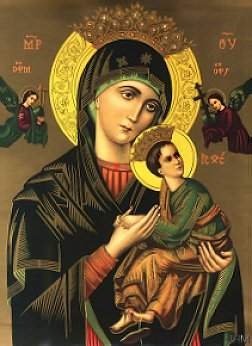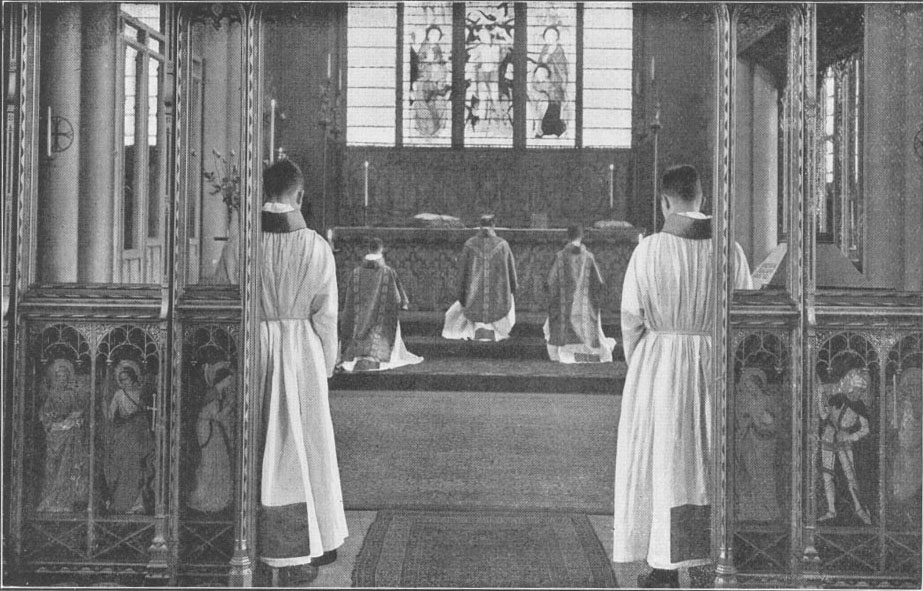On the Exterminatrix of Heresies-
As often happens, I have a lot of explaining to do around the time of the Feast of Mary's Assumption. And as always, simpler is better. Yes, she is our Queen Mother. She's the mother of the King. And yes, we think that her Son once called her to be assumed through the clouds to be in His presence in Heaven. This is what He promised to do for all of us as He did for a few of His Old Testament servants; and it just makes sense that our courteous Lord would have His mother go first in the promised resurrection of the body which He provided.
I am struck lately by how desperately the Church needs to cling to its Queen these days- not in terms of gorgeous litanies and personal affection, but in terms of the doctrinal rigor that only she can afford. The heresy of our day is that the Incarnation of God that occured in her womb is negligible. Spiritually, liberalized Christianity has decided to die the easy death of those who follow an unembodied Christ ideal. Our atmosphere is rife with such lovely-sounding, air- headed proposals of uber New Age spiritualities that make the devil chuckle. Politically, a national culture that once generally affirmed that the Body of Jesus saves us now has its future threatened by the irritated Islamic heresy that does not tolerate this truth, while from within, we kill our unborn babies and "euthenize" our infirm because we have forgotten that from the reality of the Incarnation, every human body intrinsically belongs to God. And all the while, the sacred warning of I John rings in the backgound like a distant memory... every spirit that denies that Christ is come in the flesh is the spirit of antichrist... who is the antichrist but he who denies that Christ is come in the flesh...any spirit that denies...
The Church has not forgotten that we are saved by knowledge of the Son, in the Biblical sense. The Church has not forgotten that we are not saved by a set of well-worded propositions about God, but by the visceral, physical reality of Jesus of Nazereth, who is God united to human flesh. The Church has thus not forgotten that Mary, above and beyond all the human creation, really knows the Son. He is her Son. She knew his stirrings in her own body before His birth. She recognized dominant DNA patterns from her parents and grandparents in His features. She knew Him when He was two. While He grew in wisdom and stature, she knew what He liked to eat and what He did not (look people, this is essential to what Christianity is- the firm conviction that God in Christ probably has favorite foods). It is she who knew that just as much as His human will grew in perfect conformity and union to His divinity, He had eyes of a certan color and pains of a certain sort, and she knew exactly what His excruciating bloody wounds looked like on the day He died for the great love of His life. And it is thus that it is Mary, the mother of our Lord, who can uniquely crush that elegant and sinister lie that God has not come in the flesh, that redeeming Truth is separate from a Person. Mary wiped His nose and rocked Him to sleep. She knows.
History has proven that it is the mother of God who protects the essential, precious truth of our salvation: the Word is made flesh and dwelt among us. Several essential aspects of the Church’s worship and confession were expressed around the 4th century in response to the proposals of detractors. The first, at the Council of Nicaea in 325, declared that Christ is fully God. At stake was an understanding of salvation: the Cross can save us only if the Crucified Redeemer is fully divine. Once the Church had expressed that the Son is also fully man at the Council of Constantinople in 381, the third statement, expressed shortly thereafter at the Council of Ephesus in 431, responded to the proposals of Nestorius.
Nestorius wanted above all things to evade the harsh implications of the Cross. In sum, Nestorius was convinced that a God who suffered in the flesh could not save us. Surely such a God would have ceased to be God. So, Nestorius invented the sad proposal that I have run into over and over again: Jesus of Nazareth is not fully God because in Him God is not fully united to man. Jesus is only a "temple" in which God dwells; the child born of Mary may be honored as the vessel in which God's power became manifest, but Jesus cannot be worshipped as God. In short, the Nestorian heresy contended then (as it contends now) that the Word has not been made flesh, that God has not united Himself to us.
As promised, the Holy Spirit led Christ's Church into all truth, and the conciliar clarification came through loud and clear in the orthodox doctrine that Catholic Christians confess today while we joyfully worship Jesus. Mary's testimony won the day: the Person conceived by the Holy Spirit in her virginal womb is Himself the unity of God and man. He has a rational soul and a human body born of His mother; everything that belongs to a real human is in the divine Christ. The subject of the whole human reality is the Logos, which He took on from the Virgin in mortal time. With respect to His essential humanity born of Mary, God was born, God suffered, God did everything that Jesus was doing… the one who was born of the Jewish girl is the same as the one who was begotten of the Father before all worlds. As Athanasius had put it, the whole Christian story must be the story of Jesus’ descent and ascent- of the Logos' descent into our flesh, and of the taking of our flesh into the very heart of God. The story of salvation is the story of the Logos, from the bosom of the Father, to the depths of our flesh, returning to the Father clothed forever in our flesh, fused with it. What Christ has not assumed of our nature and united to His godhead cannot be healed.
The conclusion centered on Mary. In the end, in summary of the Church's Christological confession, Mary was declared Theotokos, Mother of God- not mother of a fleshly "vessel," nor mother of an earthly "temple." Rather, she herself was known to be the Vessel and Temple in whom God Himself had dwelt. In sum, we are left today with the historic Fourth Anathema against Nestorius: if anyone distributes between two persons/subjects of Jesus Christ and attaches some to the man as separated from God, let him be anathema.
The lie that the second Person of the Trinity had not come in the flesh and been born of a woman was silenced. At the time, the Church celebrated with processions similar to those that Catholic churches will perform tomorrow. In defeat of the heresies, an image of the mother of God Incarnate is paraded through the towns of the fallen world in public proclamation that the hellish lies about her Son have to stop at her humble feet. The Church recalled prayers from the Fathers Eusebius, Cyril of Jerusalem, Origin, and Gregory of Nazianzan then, as we do now: sub tuum presidium, we fly to your patronage, oh holy mother of God. Do not reject our prayers in time of need... you who alone are pure, holy and blessed... if anyone does not believe in Mary as the Mother of God, he is severed from the godhead…
(On this Feast of the Assumption, while I am in glad procession against deadly heresies, I will enjoy recalling the prayer of a more modern figure):
In this work whereby she was made the Mother of God, so many and such great good things were given her that no one can grasp them. ... Not only was Mary the mother of him who is born in Bethlehem, but of him who, before the world, was eternally born of the Father, from a Mother in time and at the same time man and God...She is full of grace, proclaimed to be entirely without sin- something exceedingly great. For God's grace fills her with everything good and makes her devoid of all evil...The veneration of Mary is inscribed in the very depths of the human heart...It is the consolation and the superabundant goodness of God, that man is able to exult in such a treasure. Mary is his true Mother, Christ is his brother, God is his father...Mary is the Mother of Jesus and the Mother of all of us even though it was Christ alone who reposed on her knees . . . If he is ours, we ought to be in his situation; there where he is, we ought also to be and all that he has ought to be ours, and his mother is also our mother.
- Martin Luther.










